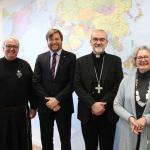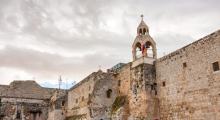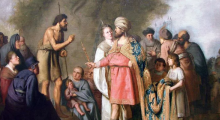Issued by the Catholic Center for Studies and Media - Jordan. Editor-in-chief Fr. Rif'at Bader - موقع أبونا abouna.org
Cardinal Pierbattista Pizzaballa, Latin Patriarch of Jerusalem, believes that the end of the war in Gaza is in sight but warns that the suspension of military operations does not equal peace.
“I think that the peak of the war in Gaza is behind us. The ceasefire with Hezbollah also influences Gaza and Hamas. My impression is that in the coming weeks or months we will arrive at some compromise,” said Patriarch Pierbattista Pizzaballa, during a press conference that has been organized by pontifical charity Aid to the Church in Need (ACN).
“But the end of military hostility is not the end of conflict. When the military operation finishes, what will life be like in Gaza? Who will be there? It will take years to rebuild, and I am sure the border with Israel will remain closed, so what is the future for these people?”
Patriarch Pizzaballa, who visited the international headquarters of ACN decried the current atmosphere of distrust in the Holy Land, saying that “what concerns me is the level of hatred. The hate speech, the language of contempt, the denial of the other, is very problematic.”
“We have had other wars, but there is a before and an after 7 October, because the kind of violence that took place, and the emotional impact on the respective populations has been enormous. While the events were a sort of ‘Shoah’ for Israelis, for Palestinians what happened afterwards is a new ‘Nakba’, trying to expel them from their land.”
When the war finally ends in Gaza, he added, “we can rebuild the infrastructure, but how can we rebuild relationships?”
Patriarch Pizzaballa believes that Christians, who compose 1.5 per cent of the population of the Holy Land, are in a privileged position to contribute in this respect. “Because we are so small, and politically irrelevant, we have the freedom to connect with everyone. Where there are so many wounds and divisions, being able to reconnect is one of the main missions for the future.”
Struggling to remain united
Although the Christians in the Holy Land may be few, and Latin rite Catholics fewer still, there is no shortage of variety. The Arab-speaking Christians form the majority, but there is also a small community of Hebrew-speaking Catholics, and another of refugees and asylum seekers. Holding these communities together has at times been difficult, Pierbattista Pizzaballa admitted during ACN’s conference.
“While in this war everybody is struggling to divide, we are struggling to remain united. It was not easy, especially at the beginning of the war. We have one faith, but people have different visions and ideas. Now it is much better, but after the war we have to talk about our differences and about what unity is. This is also something very healthy, for us Christians, it helps us to take a step forward. We must grow in our relations, to have a deeper, more serious relationship between us.”
“There is still hope”
The war in the Holy Land is having serious economic consequences for the Christian population. Almost all the Christians in the West Bank who worked in Israel have had their permits revoked since the beginning of the conflict, and those who depended on pilgrims have been faced with the paralysis tourism sector.
Stressing that it is essential that Christians remain in order to “keep the memory of Jesus alive in the Land of Jesus”, the Patriarch insisted on a narrative of hope which cannot, however, be confused with a belief in a short-term political solution to the crisis.
“If you identify the hope for the future with a political solution, there is no hope, because there is no short-term solution. I hope to be wrong. But I am afraid I am not.”
“However, hope is an attitude of life, a way of seeing the reality of your life with faith. Faith is to believe in the presence of God, who transcends our earthly life. If you can see with faith, you are able to see something that transcends, goes beyond the dark reality we are in. Only with faith can you do this. And this is still possible!” the Patriarch exclaimed.
“Many people think these are just nice words, but it is real. Everywhere, from Gaza to the West Bank, Jerusalem and Israel, I see wonderful people ready to commit themselves to doing something for others. Where there are these acts of selfless love, there is hope, it means it is possible to change something. Maybe we cannot change the macro political situation, but we can change something where we are, and this is what comforts me.”
“I also feel powerless sometimes, because I see problems everywhere, but when I see all these wonderful things still being done in all the parts of our Church, I see there is still hope,” said Patriarch Pierbattista Pizzaballa.
During the conference Cardinal Pizzaballa thanked ACN who has had projects in the Holy Land for many years, but since the beginning of the war in October 2023 has stepped up its support. According to executive president Regina Lynch, who welcomed the Patriarch to the conference, “thanks to our benefactors we have been able to provide more than 1.2 million euros in emergency relief support to the Christians, specifically as a response to the acute crisis. The projects supported include emergency food, water, medicine supplies and job creation and internship opportunities.”
“But ACN’s mission is not only to provide material support for the Christians in the Holy Land but to pray for them and to give them a voice. We also have a duty to promote reconciliation and peace between religious and ethnic groups, however impossible this may sometimes seem,” Regina Lynch concluded.











